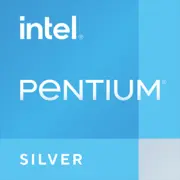Intel Pentium Silver J5005

Intel Pentium Silver J5005: Budget Processor for Everyday Tasks. A Detailed Review
April 2025
Architecture and Manufacturing Process: Gemini Lake in Detail
The Intel Pentium Silver J5005 processor, released in 2017, belongs to the Gemini Lake family. Despite its age, it is still found in budget laptops and mini-PCs. Its key features include:
- 14 nm Process Technology: An outdated technology by 2025 standards, but sufficient for basic tasks.
- 4 Cores and 4 Threads: All cores operate at a base frequency of 1.5 GHz, with a turbo boost up to 2.8 GHz.
- Integrated Graphics UHD Graphics 605: 18 execution units (EUs), frequency up to 800 MHz. Supports 4K via HDMI 2.0 and VP9/H.265 decoding.
The CPU architecture is optimized for energy efficiency rather than high performance. The Goldmont Plus cores do not support hyper-threading, limiting multitasking capabilities. However, it is adequate for web browsing, office applications, and streaming video.
TDP 10 W: Power Consumption and Thermal Design
The TDP (Thermal Design Power) of 10 W is the main advantage of the J5005. This allows:
- The use of passive cooling (fanless), as seen in the ASUS PN40 mini-PC.
- Long battery life in laptops—up to 10–12 hours (e.g., Lenovo IdeaPad 3 15).
- Reduced heat generation, which is important for compact devices.
However, under load (e.g., video rendering), the processor quickly reaches the TDP limit, and the frequency drops. This limits its performance for prolonged tasks.
Performance: What Can the J5005 Handle?
Geekbench 6 test results (376 points in single-threaded and 1031 in multi-threaded mode) position the J5005 at the level of mid-range smartphones from 2023–2024.
Real-World Task Examples:
- Office Work: Microsoft Office, Google Workspace, PDF editors—no delays.
- Multimedia: Watching 4K videos on YouTube, Netflix (hardware decoding).
- Gaming: Only light games—Minecraft at low settings (20–25 FPS), Stardew Valley, older titles like Half-Life 2.
The Turbo Boost mode briefly raises the frequency to 2.8 GHz, but under load lasting more than 5–7 minutes, throttling occurs. For example, during the conversion of a 30-minute video in HandBrake, speed will drop by 20–30%.
Usage Scenarios: Who is the J5005 Suitable For?
This processor is a choice for those who value battery life and low price:
1. Students: Text processing, online courses, Zoom conferences.
2. Office Workers: Documents, email, browsers with 10+ tabs (but without heavy scripts).
3. Home Users: Watching movies, social media, basic photo editing (e.g., Canva).
Not Suitable For:
- Video editing (even at 1080p).
- Modern games (Fortnite, Cyberpunk 2077).
- Programming in heavy IDEs (Android Studio, Unity).
Battery Life: How the J5005 Saves Power
Laptops with this processor (e.g., Acer Aspire 1) are equipped with 40–50 Wh batteries, providing 8–10 hours of use at 150 nits brightness. Energy-saving technologies include:
- Intel Speed Shift: Dynamic frequency management.
- C6/C7 States: Deep sleep states for cores during idle.
- Adaptive Brightness: A light sensor adjusts screen brightness.
Important: Battery life significantly depends on the OS. Windows 11 consumes 15–20% more power than Linux (Ubuntu, Fedora).
Comparison with Competitors: Where J5005 Excels and Falls Short
- AMD Athlon Silver 3050e (2020): 2 cores/2 threads, TDP 6 W. The J5005 is faster in multi-threaded tasks (+30% in Cinebench R23), but lags in battery life.
- Apple M1 (2020): Four times higher performance, but laptops with M1 start at $800 (MacBook Air), while devices with J5005 range from $250 to $350.
- Intel Celeron N5100 (2021): Comparable TDP (6 W), but has 4 cores/4 threads and a newer Jasper Lake architecture. In Geekbench 6 Multi Core, it scores 1200 points, which is 16% higher than the J5005.
Conclusion: In 2025, the J5005 is an option only for the most budget-friendly devices (up to $300). Competitors include used laptops with Core i3 of the 8th generation.
Pros and Cons: Is It Worth Buying?
Strengths:
- Price: Laptops with the J5005 cost $250–$350 (e.g., HP 14-dk1000).
- Quiet Operation: Passive cooling or low-speed fans.
- 4K Support: Can connect to high-resolution monitors.
Weaknesses:
- No support for AVX-512 and AI acceleration.
- Limited upgrade options: RAM and SSD are often soldered to the board.
- Weak single-core performance: Slower than Core i3-1115G4 by 45%.
Recommendations for Choosing a Laptop
If you are considering a device with the J5005, pay attention to:
1. Type of Device: Ultrabooks (Dell Inspiron 14 3000) or convertibles (Lenovo Flex 3).
2. Screen: At least Full HD (1920×1080) — HD (1366×768) is outdated even for office use.
3. Memory and SSD: 8 GB RAM and 256 GB SSD are the minimum requirements for Windows 11.
4. Ports: USB-C with DisplayPort support will be useful for external monitors.
Avoid:
- Laptops with HDDs instead of SSDs.
- Models with 4 GB RAM (Windows will lag).
- Devices without warranty (the J5005 often appears in refurbished options).
Final Conclusion: Who is the Pentium Silver J5005 Suitable For?
This processor represents a compromise between price and basic functionality. It is suitable for:
- Parents for children's education: affordable and hard to break.
- Seniors: Simple interface, long battery life.
- As a secondary device: For travel or work in cafes.
Key Benefits: Saving $200–$400 compared to laptops with Core i3/i5, the ability to work all day without a power outlet. However, if the budget allows, it is better to choose devices with Intel N100 (Alder Lake-N) or AMD Ryzen 3 7320U—they offer 50-70% higher performance at a similar price ($350–$450).
Basic
CPU Specifications
Memory Specifications
GPU Specifications
Benchmarks
Compared to Other CPU
Share in social media
Or Link To Us
<a href="https://cputronic.com/cpu/intel-pentium-silver-j5005" target="_blank">Intel Pentium Silver J5005</a>